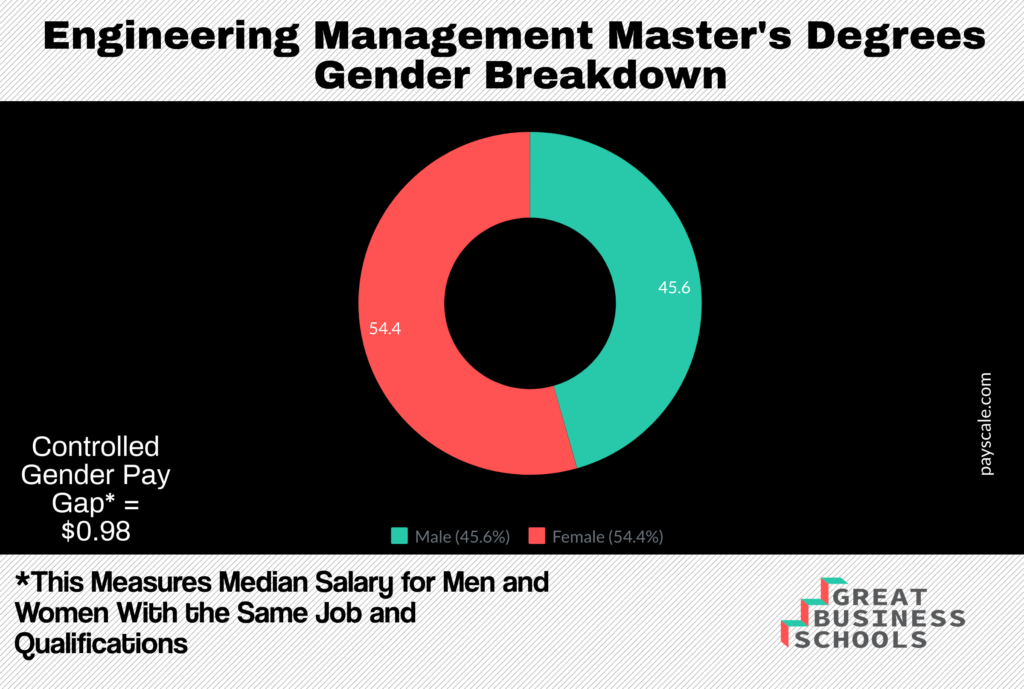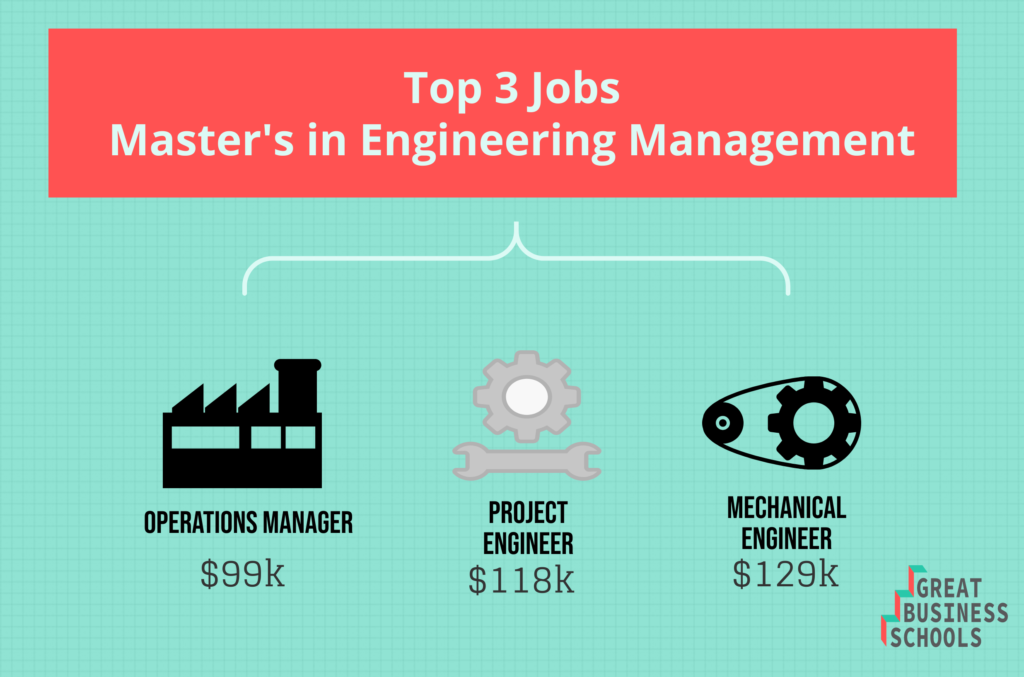Is a master’s in engineering management worth it? With technology at the forefront of business in the 21st century, there’s no doubt – yes, a Master’s in Engineering Management is definitely worth it.
The field of engineering is the professional practice where scientific principles are applied to the construction of structures and machines. Think bridges, buildings, vehicles, tunnels, or roads. It might help to learn that the word engineering can trace its roots to the Latin word Ingenium – which means to conceive with cleverness and skill.

As you consider your educational options with regard to engineering management, be sure to find the answers to these questions –
- What can I do with a master’s in engineering management degree program?
- Is a master in engineering management worth it if I have yet to work professionally?
Most Master’s in Engineer Management (MEM) degree candidates will have gained some industry work experience before entering into a MEM degree program, which is when an engineering management masters worth it.
What is Engineering and Business Accreditation?
Accreditation is basically an educational quality control process. The process seeks to evaluate schools and programs to ensure that programs offered to deliver the educational experience that has been promised.
There are two primary categories with regard to accreditation – Regional Accreditation and Specialized Accreditation.
Regional Accreditation
A college or university that is awarded regional accreditation has met the criteria as set forth by the six regional agencies organized by the United States Department of Education. Regional accreditation is a form of accreditation that is awarded by the US federal government.
Specialized Accreditation
Specialized accreditation is typically overseen by professional organizations that are sanctioned separately by each industry. Unlike regional accreditation, specialized accreditation is voluntary and is a process that often has more stringent standards than its regional counterpart.
Considering the importance of specialized accreditation, it should be no surprise the best masters in engineering management programs will have been awarded accreditation by the Accreditation Boards of Engineering and Technology (ABET). So, as a potential student of one of these best master of engineering management programs, an essential part of the research phase should include a list of the best universities for masters in engineering management or the best schools for masters in engineering management will the entire degree available online.
To learn more about engineering school accreditation to learn the answer to this question – Is ABET accreditation important, and if so, why? Try also to consider an ABET-accredited online degree to open up the list of possible schools to attend.
Is ABET Accreditation Important?
Students interested in attending a college/university that has received engineering school accreditation will likely find that most of the best engineering management masters programs will have met the ABET accreditation requirements.
The Accreditation Boards of Engineering and Technology operates independently has no one to answer to with regard to guidance/intervention. Potential students considering enrolling in an engineering management program should confirm that the selected degree program meets ABET accreditation requirements.
Are you still pondering the question – Does ABET accreditation matter? The short answer is yes; just ask the 4,000+ engineering management programs that have been awarded ABET accreditation, having met the ABET accreditation requirements.
Types of Engineering Management Master’s Degrees
An engineering management (MEM) program is designed to improve one’s leadership abilities. Most engineering management students will have a scientific/engineering background but may lack managerial skills and experience.
Fortunately, there are many options for those students who wish to attend an on-campus or online master’s degree in engineering management degree programs. Earning an engineering management masters degree online is a great option for those who want to earn an online engineering management masters degree while still working full-time.
Engineering management master’s degrees may be offered by engineering schools, business schools, or, often, by a collaboration of the two. For instance, an engineering school may offer a Master’s in Engineering Management, while a business school may offer an MBA in Engineering Management. They may also work together to offer a dual Master’s in Engineering and an MBA or Master’s in Management.
Many of these online degree options are available from top universities – offering students both affordable programs with the flexibility needed to work concurrently.

Certifications/Licenses in Engineering Management
Students are awarded engineering management certifications when they have completed certain goals and objectives within a certificate program. There are a variety of engineering management certification options from which to select.
A graduate certificate in engineering management is the academic paperwork used to open professional and managerial job options in engineering. An engineering management graduate certificate will prepare a student for a career in which both engineering and business skills are required.
A few examples of engineering management certifications would include both available graduate certificate in engineering management online and on-campus, as follows –
- A Graduate Certificate in Engineering Project Management that specialized in innovation and entrepreneurship in engineering from the University of Colorado at Boulder.
- A PMP engineering management certification is offered by the Project Management Institute.
- The Society of Manufacturing Engineers, along with the American Society for Engineering Management, offers the EMPC designation – The Engineering Manager Professional Certification.
Careers with a Master’s in Engineering Management
The engineering industry is quite comprehensive and far-reaching. The industry offers many types of master of engineering management job opportunities. The reality is that the skills acquired by a graduate of an engineering masters degree program are applicable to many fields and industries to maintain a safe and effective operation.
According to the statisticians at the Bureau of Labor Statistics (BLS), the engineering management industry (along with architecture managers) is anticipated to grow at the average combined industry growth rate of 3 percent through the year 2029, which is about the same rate for the expected growth of all occupations.
As you refine your academic options for an engineering management degree, consider these questions –
- What job opportunities for masters in engineering management are most in-demand?
- Which masters in engineering management jobs pay the most?
- Are there well-paying jobs for masters in engineering management degree graduates who have earned their degree online?
- Where can I find the best masters in engineering management job prospects?
- Which master of engineering management jobs are in the aerospace field?
- Are there masters of engineering management jobs that will meet my salary expectations?
The list shown below identifies the many different engineering management masters jobs. Note how these jobs, after a master in engineering management degree, has been earned crosses a variety of industries.
- An Agriculture Engineer – An Agricultural engineer is the problem solver in the areas of environmental issues, power supplies, and buildings.
- A Chemical Engineer – A chemical engineer solves issues regarding fuel, drug, and food usage, among other issues.
- An Environmental Engineer – An environmental engineer uses the fields of soil science, engineering, and biology to resolve issues regarding ecological issues and other concerns.
- A Materials Engineer – A materials engineer develops essential processes and assesses test materials.
- A Petroleum Engineer – An engineer in the petroleum industry resolves oil/gas extraction problems. It is noted that a petroleum engineer is one of the highest paying occupations within the engineering field.
- A Mechanical Engineer – An engineer that works in the field of mechanical engineering works with the development and construction of jobs offer careers in the design and construction of devices are thermal sensors.
- An Electrical & Electronics Engineer – Electronic or electrical engineers are responsible for managing and innovating electronic devices to solve problematic issues. Each of these engineering specialties requires similar educational and work experience.
- An Industrial Engineer – An industrial engineer is tasked with developing effective systems that help to streamline processes that involve machinery, systems, and people.
- A Civil Engineer – A civil engineer is adept and skilled at the development and the construction of various infrastructures.
- A Mining or Geological Engineer – A geological/mining engineer is tasked with the responsibility of creating safe, effective processes in the mining of materials that are used in manufacturing processes.
- A Nuclear Engineer – A nuclear engineer is responsible for the design (including research) of those instruments that are used in the creation of safe nuclear energy production.
- A Health & Safety Engineer – A health & safety engineer is responsible for the development of processes and procedures that help to ensure the safe design of manufacturing of items that will be sold to the general public.

Engineering Management Master’s Salary
The US Government manages the Bureau of Labor Statistics, an agency that provides historical and current data for many occupations across the sectors in the United States. Students interested in enrolling in a masters in engineering management degree program are advised to check out the valuable information available regarding an average or potential masters of engineering management salary options.
The actual engineering management masters salary options will be contingent on the job’s location, the industry, and other important factors.
According to the BLS statisticians, the median annual master of engineering management salary for 2019 (categorized along with architectural managerial professional) was $144,830, with a median hourly salary of $69.63.
Additionally, the Bureau of Labor Statistics reports the following important employment data for architectural and engineering managers –
- Nearly 200,000 individuals were employed in engineering and architectural managerial positions in the United States during 2019.
- It is anticipated that the job growth for the architectural and engineering marketplace will be about 3% through 2029. This expected job growth outlook is about as fast as the average of all of the United States’ occupations.
Which Master’s in Engineering Management Salary is the Highest?
The highest paying engineering management master’s salary is usually found in the fields of nuclear engineering, petroleum engineering & aerospace engineering.
It is often quite helpful to review salary percentile data across the master of engineering management salary spectrum –
| Salary Percentile | Salary Per Year | Hourly Salary |
| 10% | $ 92,510 | $ 44.48 |
| 25% | $ 115,670 | $ 55.61 |
| 50% | $ 144,830 | $ 69.63 |
| 75% | $ 179,220 | $ 86.16 |
| 90% | $ 208,000+ | $ 100.00+ |
For the calendar year 2019, these are the many engineering professionals employed in the United States and their relative masters in engineering management salary options –
| Engineer Job Type | 2019 Median Salary | 2019 Median Salary | Anticipated Job Growth Thru 2029 |
| Aerospace Engineers | $ 116,500 Per Year | $ 56.01 Per Hour | 3% |
| Biomedical Engineers | $ 88,550 Per Year | $ 43.95 Per Hour | 5% |
| Chemical Engineers | $ 108,770 Per Year | $ 52.30 Per Hour | 4% |
| Civil Engineers | $ 87,060 Per Year | $ 41.86 Per Hour | 2% |
| Construction Engineer & Manager | $ 95,260 Per Year | $ 45.80 Per Hour | 8% |
| Electrical & Electronics Engineers | $ 101,250 Per Year | $ 48.68 Per Hour | 3% |
| Environmental Engineers | $ 88,860 Per Year | $ 42.72 Per Hour | 3% |
| Health & Safety Engineers | $ 91,410 Per Year | $ 43.95 Per Hour | 4% |
| Industrial Engineers | $ 88,020 Per Year | $ 42.32 Per Hour | 10% |
| Industrial Production Managers | $ 105,480 Per Year | $ 50.71 Per Hour | 1% |
| Materials Engineers | $ 93,360 Per Year | $ 44.88 Per Hour | 2% |
| Mechanical Engineers | $ 88,430 Per Year | $ 42.51 Per Hour | 4% |
| Nuclear Engineers | $ 113,460 Per Year | $ 54.55 Per Hour | -13% |
| Petroleum Engineers | $ 137,170 Per Year | $ 66.21 Per Hour | 3% |
Which master’s of engineering management salary field offers the highest salary for 2019? Based on the information provided by the BLS statisticians, petroleum engineers had the highest engineering salary at $137,170 per year.
In addition to understanding the different salary and compensation packages for the many different engineering occupation possibilities, it is also helpful to review the salary data for engineering professionals based on the location of the job.
Salaries for engineering management professionals are the highest for those jobs situated in these states –
| State of Employment | Annual Mean Wage | # of Engineering Managers |
| California | $ 179,860 | 34,140 |
| Colorado | $ 178,360 | 3,400 |
| Texas | $ 171,120 | 14,500 |
| New Jersey | $ 168,080 | 4,160 |
| New Mexico | $ 165,130 | 1,530 |
The following table details those states that offer the highest employment levels for engineering management professionals-
| State of Employment | Annual Mean Wage | # of Engineering Managers |
| California | $ 179,860 | 34,140 |
| Texas | $ 171,120 | 14,500 |
| Michigan | $ 135,460 | 11,410 |
| Illinois | $ 140,690 | 8,900 |
| Massachusetts | $ 160,090 | 8,190 |
The following table details those metropolitan areas that offer the highest employment levels for engineering management professionals-
| Metropolitan Area of Employment | Annual Mean Wage | # of Engineering Managers | ||
| Los Angeles – Long Beach – Anaheim | $ 181,080 | 10,940 | ||
| Boston – Cambridge, MA – Nashua, NH | $ 163,370 | 8,040 | ||
| Detroit – Warren – Dearborn, MI | $ 141,850 | 7,060 | ||
| New York – Newark – Jersey City (PA) | $ 172,970 | 6,970 | ||
| San Francisco – Oakland – Hayward, CA | $ 186,500 | 6,940 | ||
The following table details those metropolitan areas that offer the highest salaries for engineering management professionals –
| Metropolitan Area of Employment | Annual Mean Wage | # of Engineering Managers | ||
| San Jose – Sunnyvale – Santa Clara, CA | $ 203,310 | 5,860 | ||
| Amarilla, TX | $ 198,010 | 30 | ||
| Naples – Marco Island – Immokalee, FL | $ 188,210 | 100 | ||
| Houston – Sugar Land, TX | $ 186,970 | 5,340 | ||
| San Francisco – Oakland – Hayward, CA | $ 186,500 | 6,940 | ||
The last two tables are shown below detail with the highest salaries for engineering management professionals in the non-metropolitan area as well as the highest employment levels for non-metropolitan areas with regard to engineering management professionals –
| Non -Metropolitan Area of Employment | Annual Mean Wage | # of Engineering Managers | ||
| SW New York Non-metro areas | $ 163,030 | 300 | ||
| SW Louisiana Non-metro areas | $ 162,170 | 40 | ||
| TX – Coastal Plains Non-metro areas | $ 160,970 | 130 | ||
| North Texas Non-metro areas | $ 160,320 | 190 | ||
| Southern Vermont Non-metro areas | $ 156,300 | 100 | ||
Here is the data for the highest employment in non-metropolitan areas with regard to engineering management professionals.
| Non -Metropolitan Area of Employment | Annual Mean Wage | # of Engineering Managers | ||
| SE Iowa Non-Metro Area | $ 115,320 | 390 | ||
| West – NW Ohio Non-Metro Area | $ 116,930 | 370 | ||
| SW New York Non-Metro Area | $ 163,030 | 300 | ||
| Piedmont NC | $ 130,890 | 270 | ||
| Northern Indiana Non-Metro Area | $ 126,130 | 250 | ||

Professional Organizations in Engineering Management
The engineering industry is forever evolving, with, as noted above, a variety of subspecialties from which engineering management professionals may choose.
Professional organizations within the engineering industry are created to support the profession and the professionals engaged in the profession. Professional organizations offer great benefits to their members but vary, depending on the organizational goals and regulations. One of the most critical benefits of belonging to an engineering management professional organization is the networking opportunities the membership brings to each member.
Networking is tremendously important for those seeking to develop personally and professionally. Professional organizations host conferences, publish journals, and often offer educational options to its members. Additionally, a professional organization sets forth the standards for the industry with regard to professional and educational standards.
Founded in 1852, the ASCE – the American Society of Civil Engineers has more than 135,000 members dedicated to the civil engineering profession across the globe. The ASCE is the oldest of all national engineering societies in the United States. Members stand together in support of the advancement of science through professional civil engineering.
Founded in 1895, the American Society of Heating, Refrigerating & Air-Conditioning Engineers focuses its efforts on the advancement of many different building systems, sustainability, indoor air quality, refrigeration, and energy efficiency, to name a few. The ASHRAE has a member enrollment that exceeds 56,000 members.
The AIChE – the American Institute of Chemical Engineers, is the leading professional organization for professional chemical engineers. More than 59,000 members strong, the AIChE offers support services to more than 100 countries globally. This professional organization offers technical groups for support in initiatives like hydrogen safety, sustainability, and water solutions, among many others.
Founded in 1948, the AAAS is dedicated to advancing engineering/science/innovation to benefit every citizen of the globe. The AAAS holds the distinction of being the largest multi-disciplinary professional organization as well as a prolific publisher of research journals.
Established in 1880, the ASME – the American Society of Mechanical Engineers offers its members a variety of benefits through its outreach programs, training, conferences, continuing education, and professional development options. The ASME has more than 105,000 members that hail from more than 145 countries. The ASME was first developed to respond to failures of steam boil pressure valves.
Established in 1948, the Institute of industrial and Systems Engineers offers industrial engineers the largest professional society dedicated to improving industrial engineers’ productivity and quality of work. The IISE is open to members as students or professionals.
Founded in 1929, the ASA was created to generate and disseminate information and knowledge regarding acoustics and its applications. The ASA operates with more than a dozen technical committees that represent the specialized topics in acoustics. These include, in part, acoustical oceanography, biomedical acoustics, psychoacoustics, structural acoustics, and musical acoustics, to name a few.
Established in 1944, the American Nuclear Society is a non-profit professional organization that operates internationally by unifying professional activities across the many subfields of nuclear science. The ANS is an open enrollment organization with members that range from engineers, students, scientists, educators, and engineers, among others.
Established in 2006 by merging two existing engineering professional organizations, the Institution of Engineering & Technology serves more than 165,000 members from more than 145 countries. The two original societies were established nearly 1.5 centuries before they merged to create the IET.
Established in the early 1960s, the Institute of Electrical and Electronics Engineers is recognized to be the largest professional organization dedicated to technological advancement. In 2018, the IEEE had a member population of more than 350,000 from more than 155 countries.
Established in the mid-1930s, the National Society of Professional Engineers was developed to focus on the professionals’ needs and issues of all professional civil engineers independent of the field of expertise. Members of the NSPE are provided with extensive networking, educational, and communication resources.
Established in 1932, the Society of Manufacturing Engineers is a professional organization that focuses on the many aspects of manufacturing in North America.
Carrie Morris
Author
Warren Dahl
Editor-in-Chief

